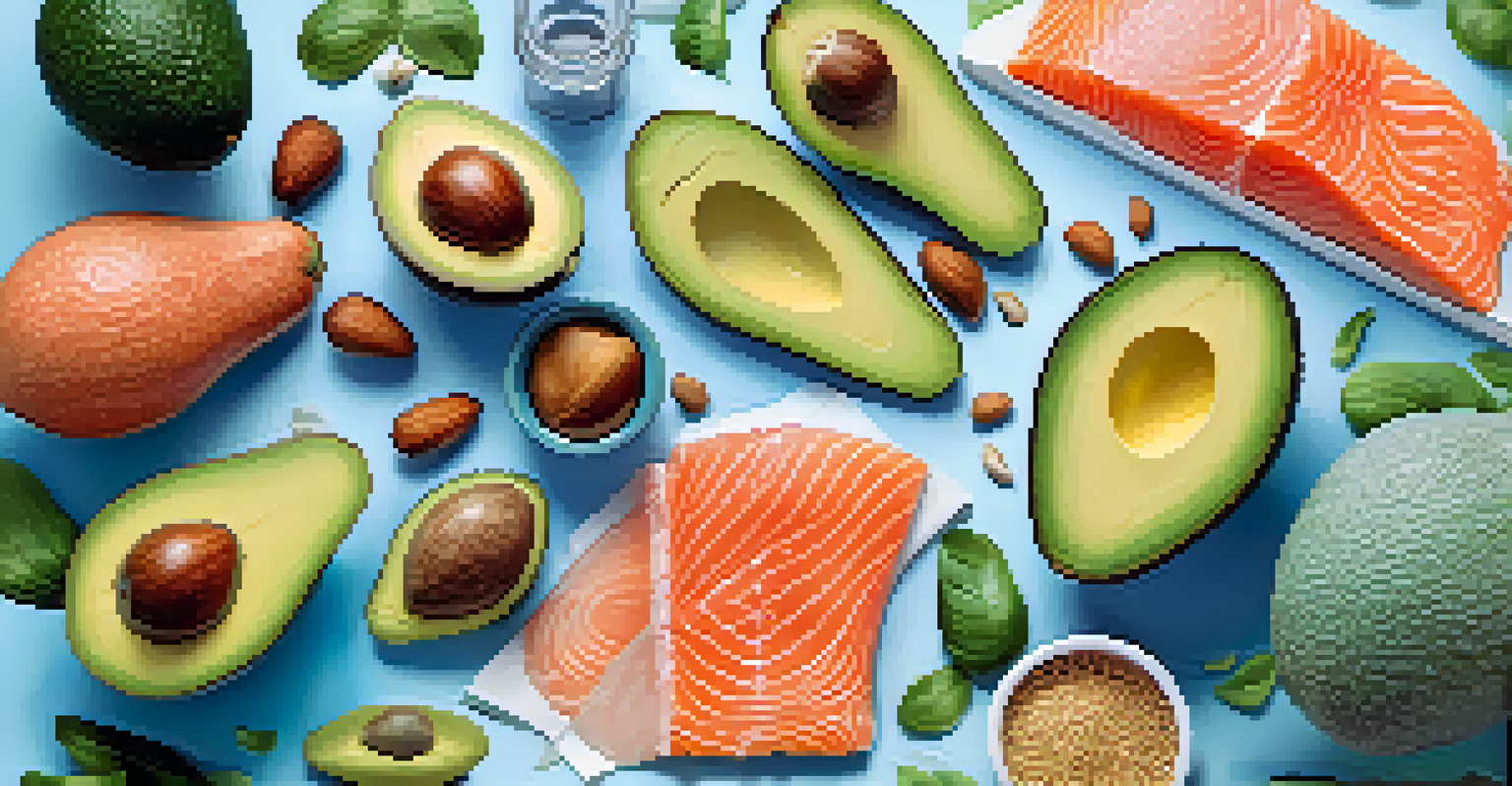Nutrigenomics: How Food Choices Can Alter Gene Activity

What is Nutrigenomics and Why Does It Matter?
Nutrigenomics is the study of how our diet interacts with our genes. It explores the relationship between our food choices and gene expression, shedding light on how certain nutrients can activate or deactivate specific genes. This field is becoming increasingly important as it offers insights into personalized nutrition and health.
Let food be thy medicine and medicine be thy food.
By understanding nutrigenomics, we can make informed food choices that not only nourish our bodies but also optimize our genetic potential. For example, a diet rich in omega-3 fatty acids may enhance gene activity related to heart health. This means that food isn't just fuel; it's a key player in how our genes function.
Ultimately, nutrigenomics empowers us to tailor our diets to our genetic makeup, potentially reducing the risk of chronic diseases. As we delve deeper into this fascinating subject, we uncover the powerful connection between our plates and our DNA.
The Science Behind Nutrigenomics
At its core, nutrigenomics examines how nutrients interact with our genetic material. When we consume food, the body breaks it down into various compounds that can influence gene expression. This interaction can lead to changes in how our bodies function, impacting everything from metabolism to disease susceptibility.

For instance, certain vitamins and minerals can act as cofactors for enzymes that modify gene expression. This means that a deficiency in a vital nutrient could hinder the body’s ability to activate beneficial genes. Conversely, a diet rich in antioxidants may enhance the activity of genes responsible for fighting oxidative stress.
Diet Influences Gene Expression
Our food choices can turn genes on or off, impacting everything from detoxification to inflammation.
As researchers continue to unravel these complex interactions, we gain a clearer picture of how our dietary choices can shape our genetic destiny. It's like tuning a musical instrument; the right nutrients can harmonize with our genes to create a healthier, more balanced life.
How Food Choices Impact Gene Expression
Food choices can significantly influence gene expression—essentially turning genes on or off. For example, consuming cruciferous vegetables like broccoli and kale has been shown to activate genes that help detoxify the body. This is a prime example of how what we eat can enhance our body’s natural defense mechanisms.
You are what you eat, so don't be fast, cheap, easy, or fake.
Moreover, the impact of food on gene expression isn't just about individual items; it's also about dietary patterns. A Mediterranean diet, rich in healthy fats, whole grains, and plenty of fruits and vegetables, has been linked to favorable changes in gene expression related to inflammation and longevity.
This means that by making conscious food choices, we can potentially influence our health trajectory. It's a powerful reminder that our daily meals can have lasting effects on our genetic expression and overall well-being.
Nutrigenomics and Chronic Disease Prevention
One of the most exciting aspects of nutrigenomics is its potential role in preventing chronic diseases. Conditions such as obesity, diabetes, and heart disease can often be traced back to our lifestyle choices, including diet. By understanding how specific foods affect our genes, we can take proactive steps to mitigate these risks.
For instance, research suggests that diets high in fiber can positively influence genes related to insulin sensitivity. This means that incorporating more whole grains, fruits, and vegetables into our meals can help regulate blood sugar levels and reduce the risk of type 2 diabetes.
Nutrigenomics Aids Disease Prevention
Understanding how specific foods affect our genes can help mitigate risks for chronic diseases like diabetes and heart disease.
The ability to personalize nutrition based on genetic predispositions could revolutionize preventive health strategies. Picture it as having a personalized roadmap to health, guiding us towards food choices that support our unique genetic makeup.
The Role of Gut Health in Nutrigenomics
Gut health plays a crucial role in the field of nutrigenomics, acting as the bridge between our diet and gene expression. Our gut microbiome—the community of bacteria and other microorganisms in our intestines—can influence how our body metabolizes nutrients and interacts with our genes. A healthy microbiome can enhance the benefits of certain foods, while an imbalanced one may lead to negative health outcomes.
For instance, fiber-rich foods can promote the growth of beneficial gut bacteria, which, in turn, can impact gene expression related to inflammation and metabolism. This highlights the importance of not just what we eat, but how our bodies process those foods.
By prioritizing gut health through a balanced diet, we can create an environment that supports optimal gene expression. It’s like creating a thriving ecosystem; a healthy gut fosters a stronger connection between our food choices and our genetic health.
Future Directions in Nutrigenomics Research
The field of nutrigenomics is continuously evolving, with exciting advancements on the horizon. Researchers are exploring how emerging technologies, like genetic testing and personalized nutrition apps, can help individuals make informed dietary choices based on their genetic profiles. This could lead to tailored dietary recommendations that optimize health outcomes.
Another promising area of research is the role of epigenetics—how environmental factors, including diet, can affect gene expression without changing the underlying DNA sequence. Understanding how our food choices can cause epigenetic changes opens new avenues for addressing health issues and promoting wellness.
Gut Health Connects Food and Genes
A healthy gut microbiome enhances nutrient metabolism and supports favorable gene expression.
As science progresses, we may soon see a future where nutrition is as individualized as our DNA, allowing us to harness the power of food to enhance our well-being. It’s an exciting time for nutrigenomics, promising a deeper understanding of the symbiotic relationship between food and genes.
Practical Tips for Nutrigenomic Living
Incorporating nutrigenomics into your daily life doesn't have to be complicated. Start by prioritizing whole, nutrient-dense foods over processed options. Focus on a colorful plate filled with fruits, vegetables, whole grains, and healthy fats, as these can support optimal gene expression and overall health.
Consider keeping a food journal to track how different foods make you feel. This can help you identify patterns and make adjustments that align with your unique body and genetic makeup. Also, don't hesitate to experiment with incorporating new foods or dietary practices that support gut health, like fermented foods or prebiotic-rich options.

Lastly, stay informed about the latest research in nutrigenomics. As our understanding of this field grows, you can adapt your eating habits to not only nourish your body but also support your genetic health. Remember, small changes can lead to significant improvements in your well-being.